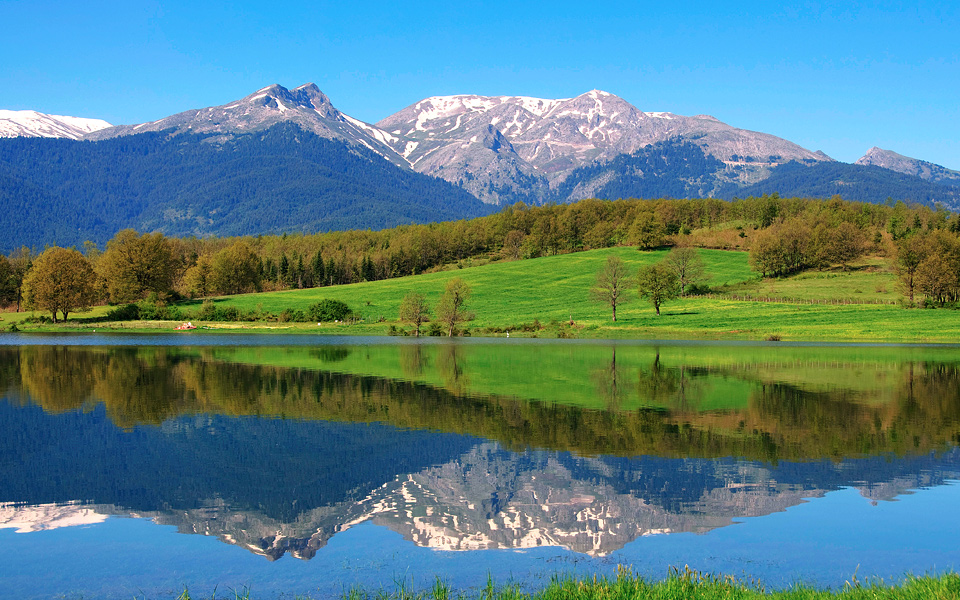The crystal-clear waters of Lake Plastira and the rich greenery surrounding it blend harmoniously with the mountain tops of the Agrafa region and its traditional little villages. The remarkably balanced beauty of the central Greek location makes it hard to believe that this lake is actually artificial. Surrounded by wild mountain slopes, the lake is an all-year round destination. The colors to be experienced at this spot of unrivalled beauty vary depending on the time of season.
The artificial lake resulted from an idea proposed by Nikolaos Plastiras, an early 20th-century military general and politician, who envisioned the construction of a dam on the Tavropos river, also known as the Megdovas, to resolve the age-old irrigation issue troubling the Thessalian plain. Although the idea was first tabled in 1925, the project was not completed until 1959. The resulting lake can hold up to 400 million cubic meters of fresh water.
During World War II, a part of the area now covered by the lake was used as a secret airbase by the Allies. It was never detected by the Nazi German forces. It is said that locals from nearby villages hid the airport’s runway with greenery during the day and lit fires at night to mark it out for approaching Allied pilots.
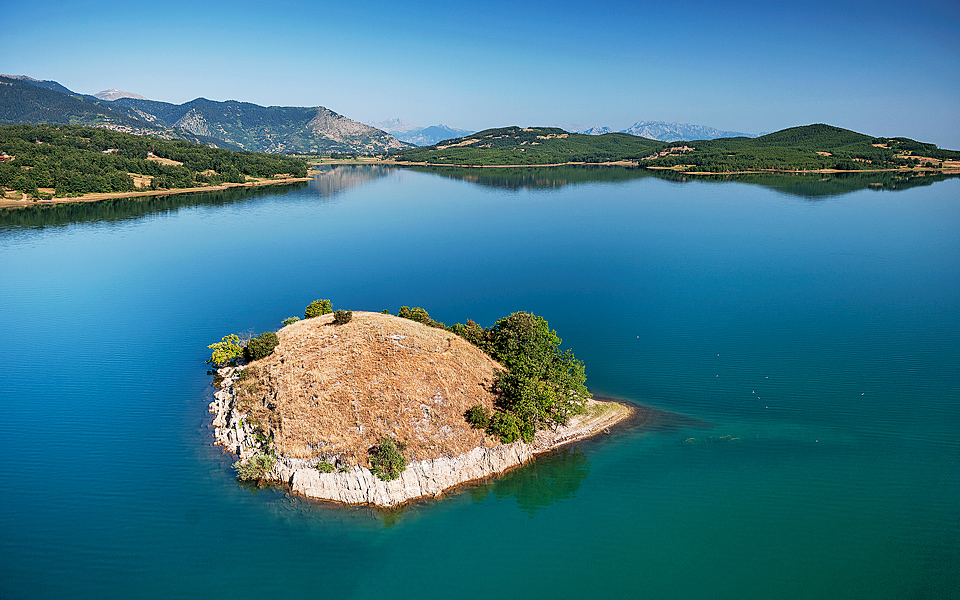
© Giannis Giannelos
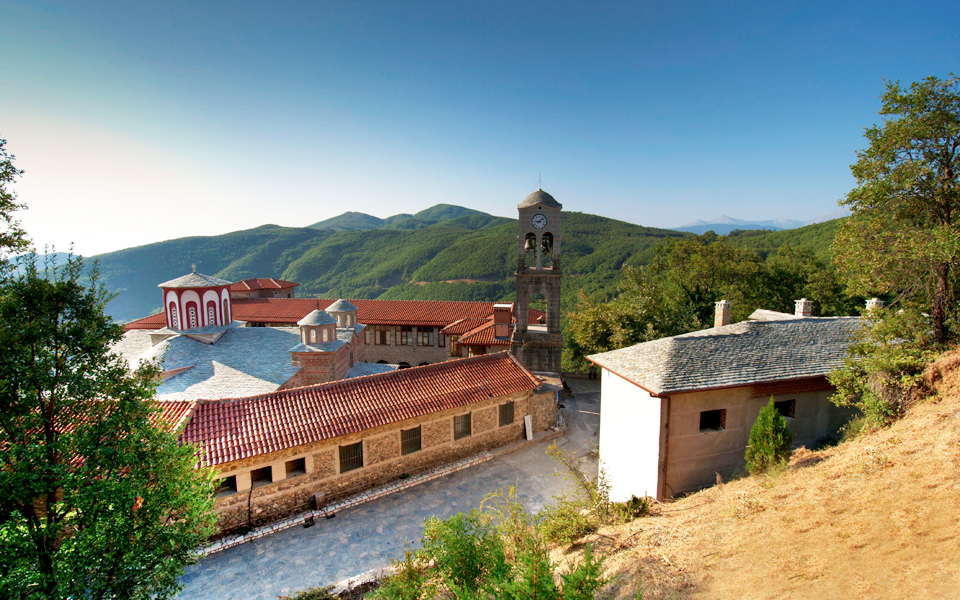
© Giannis Paisis
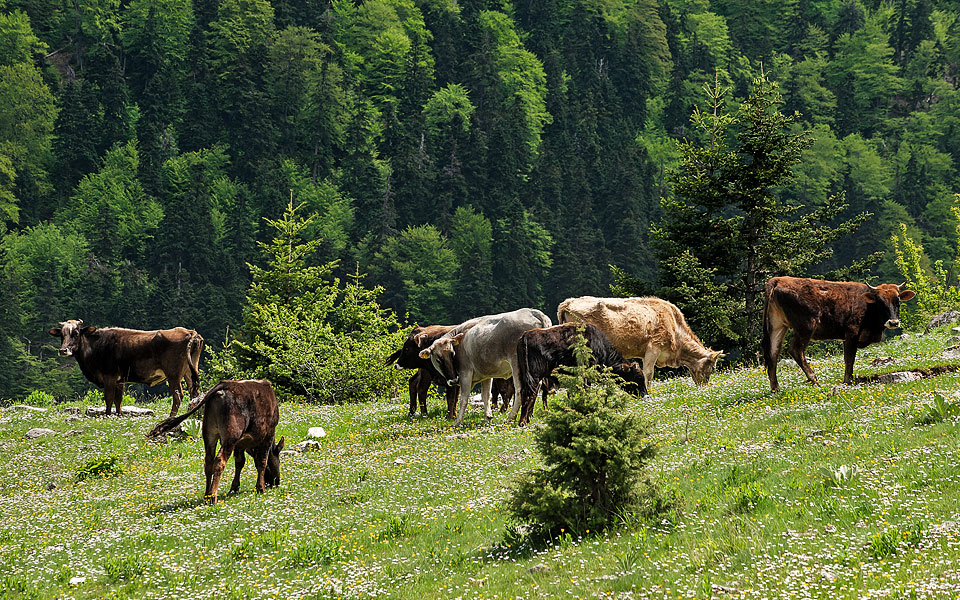
© Giannis Giannelos
Panoramic view, unique greenery
No matter what time of the year one chooses to visit, the location’s nature is astounding. The 70km road around Lake Plastira ranks as one of the most fulfilling road trips in Greece’s mountain areas. If you happen to be in the wider area, definitely devote one day to the lake and its idyllic surrounds. Explore the villages and the unique water inlets with their stunning backdrops of fir, chestnut and oak.
I began my journey at the village of Kalyvia, which is close to Fylakti. Sitting on the mountain slope, the village looks out towards the lake and the peaks of the Agrafa mountains. It also offers worthwhile accommodation options. I made my first stop on the northern part of the lake, at picturesque Kerasia, a village ideal for remote walks through nature offering panoramic views of Mouzaki village, the Thessalian plain as well as Meteora.
Strolling around the village’s alleys, I stopped at Chrysi Kardia (Golden Heart), a traditional café-grocery store that has been in operation since 1945. Its décor evokes images of 1950s Greece. Pantelis, the hospitable gentleman who runs the shop, is its true heart. He tells stories that take listeners back in time to the village’s glory days.
A few kilometers away, after a small detour, I reached Anthochori waterfall. The village features an old and restored stone bridge. Leaving behind the charming little villages of Kalyvia, Pezoula, and Fylakti – and relishing one of the most beautiful stretches of my lakeside journey – I headed towards Neraida, a densely vegetated mountainous settlement. Even Mount Olympus, which is almost 150km away, can be clearly seen from this point on a bright, sunny day. I headed downhill towards Neochori for a quick visit to the Botanical Garden, which contains representative samples of the region’s flora. Visitors can learn about the rich regional ecosystems – both in the forest and water – and examine the most important plant species found in each.
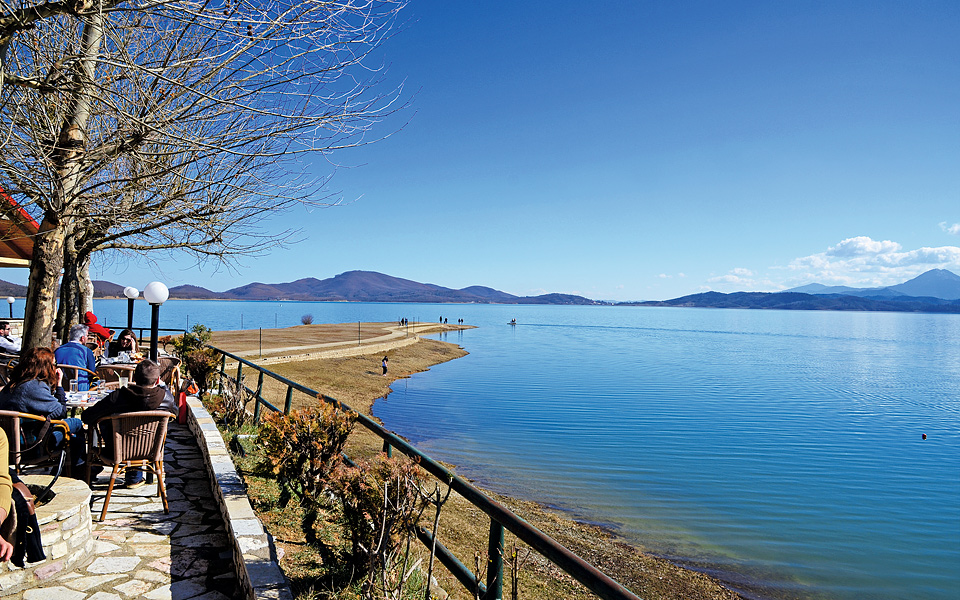
© Giannis Paisis
All roads lead to the observatory
The amphitheatrically shaped Belokomiti contains some exceptional examples of regional architecture. Elaborately adorned wood-carved verandas and doors, old stone houses featuring charming yards and the narrow side streets create a wonderful setting. Higher up, at an altitude of 1,400m, the view from Panagia Pelekiti monastery, perched on the edge of the steep mountainside, is breathtaking.
While walking along the stone-paved track, Michalis, the monastery guard, told me about its glorious past. I followed him to the secret crypts and hatches that served as meeting points for freedom fighters during Ottoman rule and was shown the murals adorning the monastery. The monastery’s elaborate construction, a true work of art carved out on the rock with great skill and zeal, was the most impressive aspect of all.
The view of the water inlets, the lake’s little island and the Agrafa mountains, as flocks of birds cross the sky, is otherworldly and unique from a vantage point called the Paratiritirio or observatory. It may be reached from a very passable dirt road stretching 1.5 km that leaves the main road. Mount Olympus may be seen in the distance. On a clear day, the towns of Trikala and Karditsa may be easily spotted.
Sunset is an ideal time to visit the lake’s shores and renowned Lampero beach for a few snapshots amid the fabulous colors. A short distance beyond Lampero, an old taverna named Tsardaki serves local culinary delights such as delicious pie with greens, lamb and stuffed cabbage rolls (lachanodolmades). Visitors should also go walking around the narrow streets of Mesenikolas, which looks out towards Mount Olympus and the Pelion mountains. Sit and relax in the cobbled square with the old plane trees and enjoy the cool breeze coming from the mountain. Visit Koroni monastery, one of the Thessaly region’s most significant religious monuments, featuring frescoes of the Cretan school. Take the road back after having made a pit stop at Morfovouni, the ancestral home of General Plastiras, the man who envisioned the artificial lake. A museum dedicated to his life and work is located there.
Where to stay:
PANDION BOUTIQUE HOTEL AND SUITES | A charming, stone-built hotel furnished with warm-colored fittings in traditional style, it offers 12 rooms with fireplaces and lake-view verandas, as well as a bar, lounge and breakfast room.| Tel. (+30) 2441.093.440
KAZARMA LAKE RESORT | Located at one of the lake’s most panoramic points, in Kalyvia, Fylakti, the resort offers 50 tastefully decorated and furnished luxury rooms with a view of Lake Plastira and the Agrafa mountains. Features include a spa-hamam with heated pool, sauna, Jacuzzi and massage sessions. | Tel. (+30) 2441.092.290
WILDLIFE | Eight self-contained wooden chalets surrounded by a fir forest, all equipped with fireplace, abundant firewood and heating. Fantastic view of the Agrafa mountain range and Karamanoli gorge. | Tel. (+30) 2441.094.693
MONTANEMA VILLAGE | Developed in a lovely setting, Montanema Village contains 33 apartments and villas, all stone-built in traditional style and enjoying a view of the Pindos mountains. A café, restaurant, gym, common lounge room and tourist office all operate here. | Tel. (+30) 2445.045.220.
GIS CHRYSOPELIA | Nine elegant rooms, each with a fireplace and panoramic view of Lake Plastira. | Tel. (+30) 2441.022.651
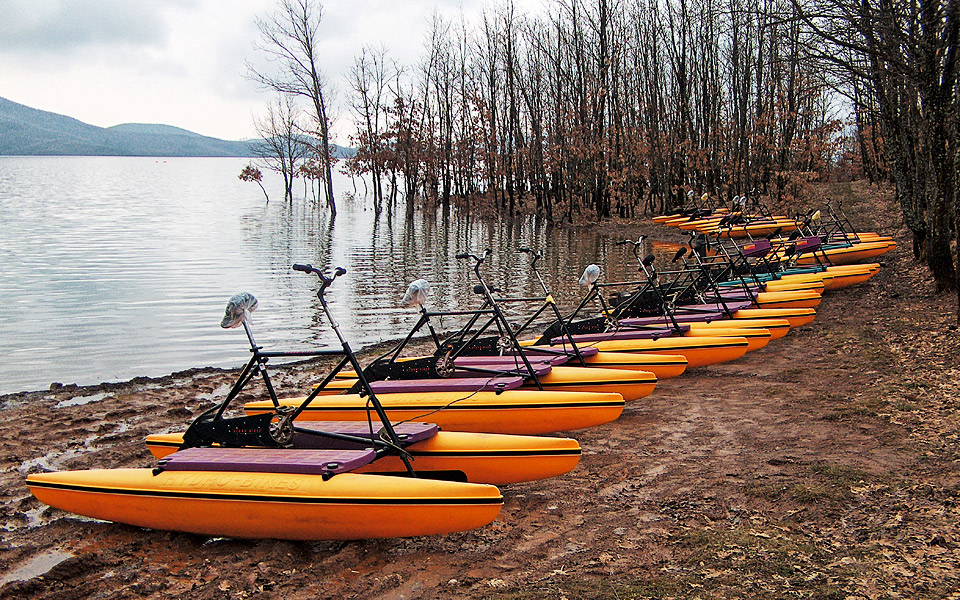
© Yiannos Larios
USEFUL INFORMATION
RECREATIONAL ACTIVITIES
• ZABETAS SALOON, 22nd km on the Karditsa–Kerasia road, tel. (+30) 694.559.3807. Ideal spot for horse riding and archery. Open on weekdays (upon arrangement), holidays and weekends from 10:30 to sunset.
• TREKKING HELLAS, Kalyvia, Fylakti, tel. (+30) 2431.087.964. Lake Plastira is perfect for canoeing and kayaking. Test your strength in the water from Pezoula beach after prior arrangement with the people at Trekking Hellas. Open on weekdays, holidays and weekends from March through October, from 10:00 to sunset.
GETTING THERE
The lake is reached by taking the Athens–Lamia national highway, via the town Domokos in the direction of Karditsa. Lake Plastira is located 20km from Karditsa and 320km from Athens.

